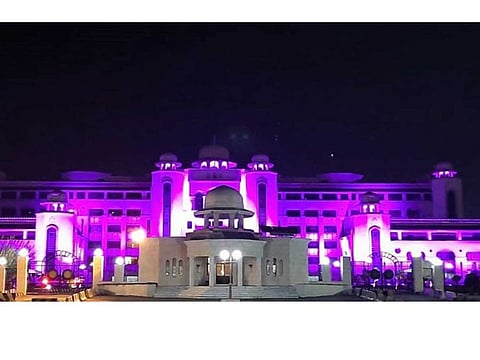Pakistan turns pink to highlight breast cancer awareness
Prime Minister, President and First Lady launch awareness drive focused on prevention

Also In This Package
Islamabad: Pakistan government buildings including PM and President House and landmarks in Islamabad have been lit up pink and posters put up on streets to highlight breast cancer awareness, encouraging regular health checkups.
Pakistan has the highest rate of breast cancer in Asia with 90,000 breast cancer cases being annually reported in the country out of which 40,000 die, reports suggest.
PM Khan wears pink ribbon to raise awareness
Prime Minister Imran Khan wore a pink ribbon at the launch of the month-long breast cancer awareness drive aimed at prevention of the disease through early diagnosis and to break down taboos, encouraging people to openly talk about the disease.
UAE Embassy in Islamabad goes pink
The Embassy of the United Arab Emirates (UAE) in Pakistan was also lit up in pink to draw attention to the importance of detection and early prevention of breast cancer in Pakistan.
Improving survival through early diagnosis
President Dr Arif Alvi and Fist Lady Samina Alvi on Tuesday called for creating awareness about the disease to improve survival through early diagnosis in Pakistan. With 40,000 deaths, Pakistan’s breast cancer mortality rate is 45 percent, much higher than to 2 to 4 percent in the world, he said. The government plans to disseminate breast cancer awareness through mobile phone messages and setting up a health helpline.
Key facts
- Over 90,000 breast cancer cases reported annually in Pakistan out of which 40,000 die. - Breast cancer stages 3 and 4 more common in Pakistan, hence early detection is important. - Breast cancer increasingly affecting younger women in Pakistan. - Breast cancer is the most commonly occurring cancer in women and the second most common cancer overall. - It can be effectively treated and cured if diagnosed early.
Alarming statistics
First Lady Samina Arif Alvi said the breast cancer statistics in Pakistan were “alarming” and urged Pakistani women to be wary about the initial symptoms and risk factors as thousands of lives are lost due to lack of awareness.
At the launch event, Minister Dr Fehmida Mirza, also a breast cancer survivor, shared that she was diagnosed during her stint as National Assembly Speaker and asked women to take cancer screening. The screening centre at Pakistan Institute of Medical Sciences (PIMS) in Islamabad offers free of cost walk-in facility of mammography screening, besides oncology services under one roof, said Focal person National Breast Cancer Awareness Campaign, Dr Ayesha Isani Majeed.
Early detection is key
Prof Dr Rukhsana Rasheed, who has an experience of 35 years in breast cancer surgery, said women should know that it “is a curable disease” provided it is detected in the early stages. Breast cancer patients had around 95 percent survival rate if diagnosed at Stage 1, 90 percent at Stage 2 and 60-70 percent at Stage 3, she said. “Since Stages 3 and 4 are more common in Pakistan, early detection is important”. She advised all women over 40 to undergo screening and mammography. Women should perform a breast self-exam at least once each month, and have a clinical breast exam performed by a health professional every year.
Pink Ribbon campaign launched
Pakistan government has launched the campaign in collaboration with Pink Ribbon, an organization dedicated to breast cancer awareness, to observe the month of October as PINKtober to disseminate information on breast cancer prevention, detection and treatment.
Pink Ribbon CEO Omer Aftab urged the government to resolve issues affecting patients such as customs duties on diagnostic equipment, particularly on mammogram and ultrasound machines. He stressed that diagnostic facilities should be available at the district level and breast cancer treatment should be “prioritized in the healthcare budget and on health cards.”
Since PM Imran Khan has been working on the issue of cancer for the last 22 years with his Shaukat Khanum Memorial Cancer Hospital, so “this is the best time to develop a roadmap to prevent and treat breast cancer in Pakistan”, he said.
Sign up for the Daily Briefing
Get the latest news and updates straight to your inbox









